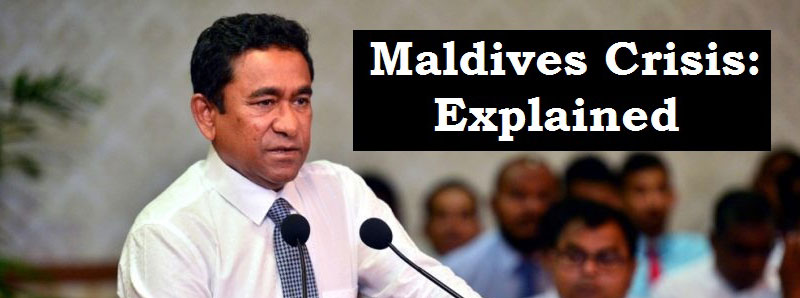Maldives: Crisis In The Indian Backyard
(Get the video lecture on this issue @ https://www.youtube.com/user/majorkalshiclasses)

(Get the video lecture on this issue @ https://www.youtube.com/user/majorkalshiclasses)
Maldives is a small island nation on the South of India. It is the smallest and the lowest country in Asia. Maldives is gripped into a political crisis. President Abdullah Yameen refused to follow the Maldivian Supreme Court’s (SC) order and then imposed State Emergency on 05th Feb. On 19th Fe. it was further extended for 30 days.
While in a global word the impact of any event goes beyond the national boundaries, yet the current crisis in Maldives has to be seen w.r.t. its possible ramifications on India’s interests.
We will understand it in three steps :-
- What the crisis is ?
- On Feb. 01 the Maldivian SC overturned the convictions of political prisoners including the former exiled President Md. Nasheed, and reinstated 12 MPs ousted for switching allegiance to the opposition.
- President Yameen overturned the orders, imprisoned the Chief Justice and imposed 15 day Emergency in Maldives on Feb. 05th.
- This led to a political crisis because :
(i) Absence of rule of law
(ii) The parliament is no more representative
(iii) Put the judiciary and the President at loggerheads with each other
- Reason behind the crisis ?
President Yameen being able to take such blatant steps can be reasoned to internal and external factors.
Internal Factor :
(i) President is the supreme authority in Maldives. He is the Head of State, Head of Govt , Commander-in-Chief of the Armed Forces and the Police of the Maldives. Further the President appoints the judges and the cabinet members. Therefore President has sweeping powers over the organs of the State.
(ii) The Judiciary in Maldives has not evolved as an effectively independent organ of the state. It is under the control of the President in terms of appointment and security of tenure. It is not the guardian of the Constitution as the Supreme Court in India is.
(iii) Democracy is new to Maldives with the current constitution being ratified in 2008 only. Therefore it has not deepened its roots both as a means to ensure people’s rule and as an administrative machinery based on idea of “balance of power”.
External Factor :
(i) President Yameen is also emboldened by significant Chinese presencein Maldives. China, which had no diplomatic relation with Maldives till 2012, is engaged with Maldives at multiple levels:-
- Maldives is party to “Maritime Silk Route” of China’s OROB Initiative.
- Huge concessional loans to Maldives for infrastructure development, in fact Chinese credit accounts for 70 % of Maldives total debt.
(ii) China being heavily invested, it is possible that President Yameen is getting instruction to act in a certain manner. The way the FTA (Free Trade Agreement) between the two countries was thrusted through the Majlis (Maldives Parliament) in just one hour is a testimony to it. He might also have got assurance against any intervention from outside, especially India.
- Impact of the crisis ?
Maldives location is geostrategicallyso sensitive that any internal problem may have a long lasting impact on the region and beyond.
(i) w.r.t. International trade
- The 26 atolls of Maldives criss-cross the shipping lanes in Indian Ocean through which around 80% of world’s seaborne trade in crude oil takes place.
- An unstable Maldives, which is so dispersed termtonally, may pose threat to the security of commercial ships. For eg.- pirates may take shelter there.
(ii) W.r.t Indian interests. Due to geographical proximity, India will be the first to receive any fallout from a volatile Maldives .
(a) Economic
- May hamper trade relations with Maldives , which is so favorable to India.
- Insecure Shipping lanes may affect India’s trade with the world.
(b) Security
- Deepen the roots of religious extremism in Maldives, which may spread to Lakshadweep islands.
- refugee crisis may disturb the law & order situation on the nearby Indian territory.
(ii) W.r.t. Indo-China relations
- The crisis in Maldives may fuel the competition between India & china for influence in the region. Being a bigger player, India has a natural leverage in the region. India tries to maintain this levarage through unilateral concessions to countries like Maldives in terms of budgetary aid, favourable trading terms, etc.
- But China is buying in its in presence through a ”concessional debt trap”. When the countries default on their loan repayment they tend to loose control over the project in which China is involved. the example of Hambantota port part is testimony to it. China is doing this to contain Indian in the region. Now if Maldives too experiences the same fate as did the Hambant of a pot in Sri Lanka, than it will further the Indo-China rivalry in the region.
What is the way ahead for India?
- India cannot sit idle to the crisis in its immediate neighborhood. A democratic Maldives is in the best interest of India. But how to go about it?
- Should India intervene militarily as it did in 1988 under ”operation Cactus”?
The answer is no. It is because-
(i) In 1988 the then President Gayoom himself requested the military intervention to avoid an attempted coup. But now there has been no official request for intervention. Those who are asking it are either exiled (former President Md. Nasheed) or are in jail.
(ii) Putting boots on the ground may harm India’s image in the local popoulation.
(iii) It may trigger a stand-off between the Indian and Chinese Navy which is conducting an Exercise in the East India Ocean.
- The better option, for now, is to pressurize president Yameen through diplomatic means.
First, put a trade blockade on Maldives. Maldives in heavily dependent on Indias for supplies of daily needs, which china is not a position to fulfill in the near future.
Second, stop all financial transactions third, impose a travel ban.
- India has to play the lead in marshalling the international community to put above measures into effect.
- Having said that, India should keep its forces on stand by mode (also alert its Naval base in Maldives) to intervene if the situation in Maldives spiral towards violence and human rights violation.










